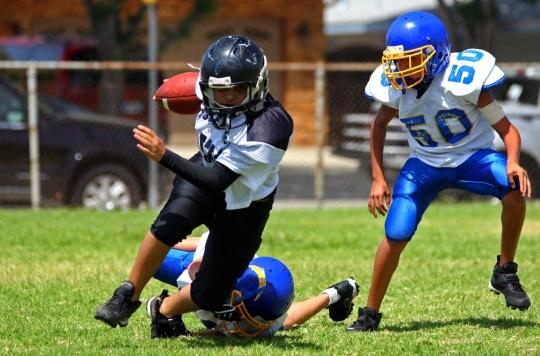American football players who have already presented concussion syndromes after a shock would be more likely to present low testosterone levels and to suffer from erectile dysfunction, according to a new study.

erectile dysfunction is defined as “the inability of a man to obtain or maintain an erection sufficient to allow satisfactory sexual intercourse for at least three months”. According to WHO, this medical problem affects about 15% of the male population every year. And the trend is on the rise: while 150 million men said they were affected in 1995, they should be 320 million in 2025. Among the possible causes at the origin of this disorder, there are many factors related to lifestyle or chronic diseases.
But it would seem that concussions have something to do with it as well. Indeed, according to a study conducted in the United States and published on August 26 in the journal JAMA Neurology, former professional American football players who experienced symptoms of concussion (loss of consciousness, nausea, disorientation, etc.) after a head injury are more likely to suffer from this affliction.
To reach this conclusion, researchers from Harvard TH Chan School of Public Health and Harvard Medical School interviewed 3,409 former National Football League (NFL) players between 2015 and 2017. 52, were asked how often blows to the head or neck made them feel dizzy, nauseous, headache, unconscious or blurred vision.
Based on the number of concussion symptoms reported, the scientists categorized respondents into four distinct categories. Then they asked the former players if a doctor had recommended any medications for them to treat low testosterone levels or erectile dysfunction and if they were currently taking any.
A lesion of the pituitary gland in the brain involved
They were able to find that those who had reported the highest number of brain symptoms were two and a half times more likely to have been prescribed drugs for these disorders than those who did not. In addition, players who reported losing consciousness following a head impact were at high risk of erectile dysfunction. And, this even if they had reported no other symptoms.
Not surprisingly, athletes with cardiovascular disease, diabetes, sleep apnea, depression, or those taking prescription painkillers were more likely to report low testosterone levels or erectile dysfunction. Indeed, these factors are known to have negative effects on sexual health. But, even taking these conditions into account, researchers were able to link a history of concussion to low testosterone levels and erectile dysfunction. It was present in both older players and those under 50, the researchers said.
This intriguing association could be explained by a lesion of the pituitary gland of the brain causing many hormonal upheavals at the origin of a decrease in testosterone and erectile dysfunction, advance the authors of the study. This theory had been put forward in the past when researchers noticed that veterans and civilians with head injuries tended to have such problems.
A common and treatable affliction
These new findings also suggest that sleep apnea and the use of prescription painkillers may also contribute to low testosterone and erectile dysfunction.
Sexual function is not only a telltale marker of general health. It is also essential to well-being, the researchers insist. Also, understanding the mechanisms at play here could help lead to better treatment and prevention strategies. “Former players with erectile dysfunction can be relieved to know that the concussions they suffered during their NFL careers can contribute to a common and treatable affliction,” concludes author Rachel Grashow. main of the study.
Note, however, that this has some limitations. Indeed, these results are based on observation only: the players themselves reported their concussion symptoms and the measurements of erectile dysfunction and low testosterone levels were carried out indirectly, concede the researchers.
In France, according to a survey conducted in 2002, 40.5% of people questioned had had erectile dysfunction for more than 6 years. Sadly, according to the French Association of Urology, the seniority of the evil “does not necessarily favor its management”. Indeed, many men who suffer from it refuse to consult, often out of modesty. Once identified, if it is not related to a specific health problem, the dysfunction can be treated by improving one’s lifestyle, by cognitive-behavioral therapy or by speaking with a sex therapist, and also often by medication.

.















